Donors
Our projects are financed by dedicated donors, primarily by the German government.
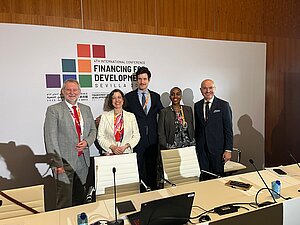
Bundesministerium für wirtschaftliche Zusammenarbeit und Entwicklung (BMZ)
(English: Federal Ministry for Economic Cooperation and Development)
Leveraging German private-sector engagement in order to promote key development partnerships is a proven instrument of German development cooperation – and one that fosters sustainable economic growth.
Germany’s Federal Ministry for Economic Cooperation and Development (BMZ) instigated its promotion programme for key development partnerships involving the German private sector, in order to mobilise the know-how and experience of German businesses, organisations and institutions, for the purpose of development cooperation.
There are around 1,184 people working at the BMZ in Germany. About 50 per cent of the staff are based at the Ministry's main office in Bonn, while the remaining half work at the Berlin office. A certain number of BMZ staff are regularly seconded from the Ministry for a few years at a time to carry out development policy assignments in various parts of the world. At present there are 130 BMZ officials deployed abroad. The budget of the BMZ is contained in the German national budget. In fiscal 2024, provision has been made for spending in the order of 11.22 billion euros.
The BMZ does not have the usual substructure of government agencies. For the execution of its projects, it commissions implementing organisations. These organisations then work with executing agencies in the partner country concerned. Those agencies are selected by the government of the partner country.
German Sparkassenstiftung für internationale Kooperation e.V. (DSIK) has been an implementing organisation for BMZ programmes since 1992. As an implementing organisation, German Sparkassenstiftung customises and aligns approaches that have proved their worth in Germany in order to transfer them to the partner country.
Development partnership projects involving German private sector actors are implemented independently of any bilateral agreements that may exist. In addition to its specialist technical inputs for BMZ funded projects, DSIK is also responsible for quality assurance and monitoring project contents and the use of financial resources, especially as projects are always executed in cooperation with local partner organizations.
In Eastern Africa, our previous regional projects “Vocational and Commercial Education for the Microfinance Sector in Eastern Africa” and “Rural Development in Eastern Africa through Institution Strengthening of the Microfinance Sector” were recently merged, retaining their topics but bundling them into one regional project "Sustainable Transformation of the Financial Sector in Eastern Africa through Institutional Strengthening of the Microfinance Sector and Socio-ecological Transformation of the Economy with a Focus on Rural Development," and still financed by the BMZ. This regional project was successfully completed in Burundi in October 2024 and simultaneously started in Ethiopia. Currently, the regional project is being implemented in five countries: Ethiopia, Kenya, Rwanda, Tanzania, and Uganda.
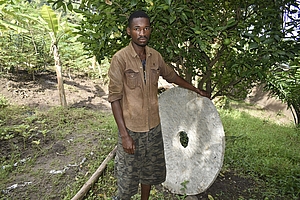
Deutsche Gesellschaft für Internationale Zusammenarbeit (GIZ) GmbH
(English: German Corporation for International Cooperation GmbH)
The German Corporation for International Cooperation GmbH (GIZ) is a German development agency that provides services in the field of international development cooperation.
GIZ has over 50 years of experience in a wide variety of areas, including economic development and employment, energy and environment, as well as peace and security.
GIZ is a federal enterprise, which works with the German Government, European Union institutions, the United Nations, the private sector and governments of other countries. BMZ is the main commissioning party.
The German headquarters of GIZ are in Bonn and Eschborn. In 2024, the business volume was around EUR 4 billion. GIZ has more than 24,000 employees in 120 countries.
Between German Sparkassenstiftung Eastern Africa and GIZ various fields of cooperation exist. German Sparkassenstiftung Eastern Africa has implemented and is implementing several projects on behalf of GIZ (e.g. in the fields of green finance, private sector development, financial education and women’s economic empowerment).
Currently in Rwanda, GIZ is funding the Women's Economic Empowerment (WEE) project which is part of the Special Initiative “Decent Work for a Just Transition” of the BMZ, and DSIK is assigned to improve the positioning of women-led businesses in the economic and social environment in Rwanda.
Additionally, the project “Business Skills Development for Returning Victims of Human Trafficking,” implemented by German Sparkassenstiftung Eastern Africa across Ethiopia, Kenya, South Sudan, and Uganda, was funded by GIZ.
In Uganda, GIZ also supported the project “Enhancing Financial and Business Skills for Small Scale Entrepreneurs” in the West Nile region.
In Burundi, GIZ funded our Green Finance Project “Améliorer l’accès des groupes d’épargne au microcrédit pour le financement des latrines agro-écologiques ‹Akasuga› ".
Also, GIZ and German Sparkassenstiftung Eastern Africa together created a seminar on the development and implementation of national strategies for financial education, which has been adapted from English to Russian and Spanish and has been implemented in Uzbekistan as well as in several countries in the Latin American region.
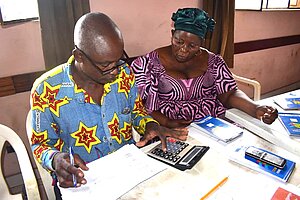
Stiftung Entwicklungs-Zusammenarbeit Baden-Württemberg (SEZ)
(English: Development Cooperation Foundation of Baden-Württemberg)
The Development Cooperation Foundation of Baden-Württemberg (SEZ) is a not-for-profit organization established in 1991 by the state government of Baden-Württemberg, Germany. SEZ promotes sustainable development, global partnerships, and development cooperation, with a strong focus on civil society engagement and global justice. It supports a wide range of actors, including NGOs, educational institutions, municipalities, and businesses.
Based in Stuttgart with 15 staff, SEZ is primarily active in Baden-Württemberg and promotes partnerships between local institutions and actors from the Global South. SEZ offers funding opportunities, networking platforms, and educational programs to support civil society and municipal actors.
One of SEZ’s main international engagements is the state partnership between Baden-Württemberg and Burundi, known as the AMAHORO! state partnership. This partnership traces its roots back to the 1980s and in 2009 a coordination office was established at SEZ to oversee and facilitate collaboration between the two regions. This partnership was further strengthened with the opening of a liaison office in Bujumbura in 2023.
In 2023, DSIK successfully implemented a project in Burundi titled "Income-Generating Measures and Social Cohesion for Women Involved in Informal Trade" that was funded by SEZ.
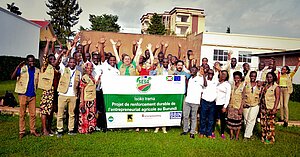
European Union (EU)
The European Union (EU), founded in 1951, is a political and economic union of currently 27 member states located in Europe. Globally, the EU seeks to uphold and promote its core values and interests by contributing to peace, security, and the sustainable development of the planet. It works to foster solidarity and mutual respect among peoples, promote free and fair trade, support the eradication of poverty, and protection of human rights, all while ensuring strict compliance with international law.
The main executive body of the EU, known as the European Commission, has its headquarters in Brussels, Belgium. Other EU institutions are located in various European cities, and they currently employ more than 50,000 staff members in total. In 2024, the EU operated with a budget of €189.4 billion in commitments and €142.7 billion in payments, supporting key priorities such as green and digital transformation, cohesion, agriculture, migration, security, external action, and administration. Commitments represent legally binding pledges to fund projects or actions, often over multiple years, and payments refer to the actual disbursement of funds during a given budget year as projects progress.
The EU is among the largest global providers of development aid, collaborating with partner countries and international organizations. Its cooperation follows the European Consensus on Development, focusing on partnership, local ownership, and long-term impact. It is in this aspect that a consortium of four organizations—AVSI Foundation, Burundi Business Incubator (BBIN), DSIK, and International Rescue Committee (IRC)—is implementing the project “Soutien à l'Entrepreneuriat du Secteur Agricole au Burundi – SESA Isoko Irama,” funded by the EU, with the aim to improve the economic situation of agricultural producers from vulnerable groups.
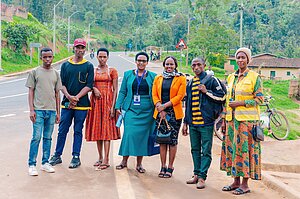
Enabel
Enabel – the Belgian Development Agency is the public agency that implements Belgium’s international development policy. Operating under the authority of the Belgian Federal Public Service Foreign Affairs, Enabel partners with countries across Africa, the Middle East, and beyond to promote inclusive and sustainable development.
Enabel works in key thematic areas such as education and training, health, agriculture and rural development, governance, gender equality, climate and environment, and digitalization. With a strong emphasis on local ownership and results-based management, Enabel designs and implements programs that respond to the priorities of its partner countries while aligning with Belgium’s international cooperation strategy and the Sustainable Development Goals (SDGs).
Enabel is active in over 20 countries, with a primary geographic focus on Africa. The agency employs more than 1,500 staff members worldwide, including both international and national experts, working in close collaboration with governments, civil society, the private sector, and other development partners. In terms of financial scope, Enabel’s operating revenue reached approximately €340 million in 2022, a significant increase from €227 million in 2018.
In Rwanda, DSIK and its local partner, the Rwanda Institute of Cooperatives, Entrepreneurship and Microfinance (RICEM), were awarded multiple projects by Enabel, which were funded by the Kingdom of Belgium. The first project initiated in July 2023 focused on empowering youth and women start-ups in Rusizi district. Concurrently, another project was launched to support existing Micro and Small Enterprises (MSEs) in Rubavu and Rusizi districts. Additionally, in April 2024, a new project aimed at supporting existing MSEs in the Karongi, Rutsiro, and Nyamasheke districts was also started. Across these projects, DSIK and RICEM carried out Business Development Services (BDS), which provided training, coaching, and mentoring to the target groups.

